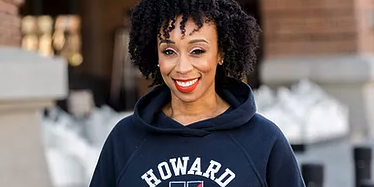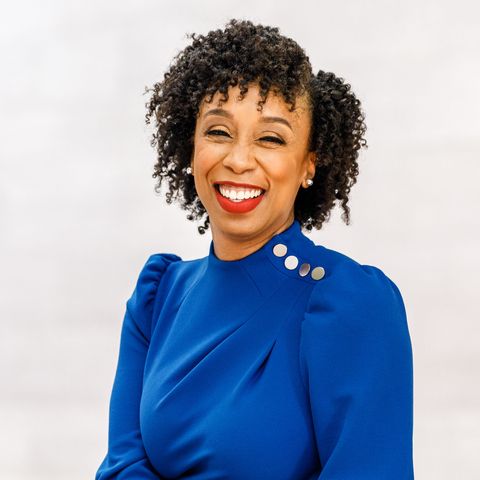How to Cope With Racial Trauma From Watching the News, According to a Black Therapist

[ad_1]
My feelings were still raw when I made the decision to go to work that morning.
It was the Tuesday after Memorial Day weekend 2020 and I was waiting for a virtual staff meeting to begin. The devastation of what had happened just one day before was weighing very heavily on me. Then, my colleague opened the meeting with, “The weather was beautiful this weekend! What did everyone do?”
My body sank with disbelief looking back at them. This was the question a work colleague thinks to ask the morning after George Floyd’s death? As the lone Black woman in the room, I felt invisible right in front of them.
I am a licensed clinical psychologist with a B.S. in Psychology from Howard University, and a Masters and Ph.D. in Clinical Psychology from George Washington University. I did my postdoctoral fellowship at the Maryland School of Medicine and am currently the program director of mental health clinic.
I am also the president and CEO of Black Mental Wellness Corp. where, along with three other co-founders, I provide resources about mental and behavioral health from a Black perspective, principally to Black men and women. Decreasing the mental health stigma in the Black community will save Black lives, and so helping to heal trauma and racial trauma within my community has been my passion and is also the core focus of my private practice, Healing Generations Psychological Services and Consultation Center.
Ahmad Aubry had been shot and killed in February 2020 while out jogging. Breonna Taylor had been shot a month later by police multiple times and died in her own bed. Then, in May, we all watched a Black man suffocating and grasping at life while meeting his death, under the knee of a white police officer. But we’re going to start the work week with a question about the weather? Okay. I welled up inside with many different emotions as I listened to their disconnected musings.
“Nicole, how was your weekend?” they asked when they got to me. And then? I just lost it.
“I can’t believe we are having this conversation, because I spent my weekend watching another Black man be killed by police officers,” I said. “And then I spent my morning with three clients who are processing that and I’m hurting. So I don’t give a *&%# about the weather right now!”
And then there was silence in that staff meeting.
The pain and exhaustion are real
This has been the separation in America for so long. Black people, whether we know the person on the news being killed or not, experience a pain that we are familiar with, that we emotionally know.
The three clients I’d seen that morning were Black men who each needed to talk about what it felt like to watch another Black man be killed intentionally and slowly. They were connecting viscerally, deeply, with their own past traumas — being pulled over by the police and feeling fear for their lives is just one example. They were hurt. They were angry. They each said, in their own way, “I don’t feel safe. I feel like I need to protect myself, my family, my children.”
Watching the news, as awful as it is for all people of conscience, is something else entirely for Black people, something we can’t effectively compartmentalize in order to quickly get on with our lives. All the past moments where we felt suffocated under the knee of white supremacy, as Black women and Black men, stir to the surface when these things happen.
Those moments that make us feel like we are invisible or like we are dying a slow excruciating dehumanizing emotional death. As Black women, as Black mothers, as Black people living in America in general, this past year has been so much more than one (very devastating) pandemic. It has been a year of reliving our own personal connections to these public moments of Black trauma and it is exhausting. Where do we get to feel safe?
Why Black people need even more self-care right now
It has been about a year since that out-of-touch staff meeting. When I heard that the verdict in the Derek Chauvin trial was about to come in last week, I made a deal with myself: Depending on how this verdict goes, I may or may not go to work the next day. The trauma I feel as a Black woman, that my clients who are Black also feel, is sometimes triggered by news headlines. And that’s just real. We’ve got to take care of ourselves first though and then we can show up for our clients or our staff, our families and all the people we love.
The guilty verdict in the Chauvin trial made me cry, hard. The next day, I asked myself what kind of self-care I needed, and I found the energy to go for a morning run. I needed to feel my feet on the ground. I needed to feel the air. I needed to feel the sun. I needed to listen to music that was going to help me release my stress because I didn’t know what was going to show up in my sessions with clients that day.
Self-care is critical right now, because the headlines continue to be relentless. The reasons we need to tend to ourselves right now have also to do with our physical health, brought on by the stress of living in a country where this violence is regularly perpetrated on us and our children. Black people suffer higher rates of many of the chronic conditions that plague modern life. These include high blood pressure, physical pain, anxiety, depression … this is because of many things, including racial socioeconomic and healthcare disparities. But I also know that some of these are the result of us not dealing with the traumatic images and events that live on repeat in our experiences as Black people, of very often doing all the “right” things or minding our own business and still seeing our brothers and sisters getting shot.
How Black people can protect our mental health
So how do we do this? Below are a few of the techniques and ideas I discuss with my clients. None of them will help everyone but one or more might very well help you. With everything that is happening in the world and with all the hurt, it is neither helpful nor healing for you to minimize your feelings and your identity out of fear of making your family or non-BIPOC friends feel uncomfortable.
- Stop to check in. When you wake up in the morning — before you reach for your phone, computer or even speak to another person if possible — notice how you are feeling. How was your sleep? What were the first thoughts that came to your mind? So often we’re on automatic and don’t recognize what we are feeling. Allow yourself a few moments to really wake up.
- Feel your feelings. Even if they hurt to feel, give your feelings some respect. Allow yourself to feel and acknowledge the full range of how what is happening in this country makes you feel. Notice what body parts feel achy, whether your stomach is swirling with that sick feeling. You don’t have to rush to push any of your feelings away. Simply notice them. Respect them. See them through.
- Find your releases. What helps you to release all of your feelings? What are some of the things that will help you feel supported and seen? Here are some things you may want to try, if you’re still learning what works for you.
- Journaling. There’s something about writing our feelings out that releases stress. We learn about ourselves being present in the moment with our feelings.
- Get your body moving. Trauma is cellular. Turn your music up. Get in nature. Do some exercises. Dance.
- Try yoga. Chelsea Jackson Roberts on Peloton really works for me. No matter how difficult that yoga pose is, you breathe your way through it. You can look up people on YouTube who adjust their yoga practice to help us deal with racial trauma.
- Allow for joy. It may seem discordant to feel joy in the face of so much pain in our community, or even in ourselves. But it’s okay to feel both — just because you allow yourself to feel joy doesn’t mean that the hurt isn’t just beneath the surface. You’re not painting over it, just releasing it. So if you find joy in eating your favorite meal, cook it. If you find joy in being reminded of home, do something that you might do when you’re in your home city. Lean into what you are passionate about.
- Find your person, people or place: We need a space to show up as ourselves — to be seen, to be vulnerable, to be honest and to know that we can trust the person that we’re sharing all this with not to use it against us. Connect with people that remind you of your purpose, your core values, your own value and who you are. This doesn’t necessarily have to be other Black people. I have a close friend who is not BIPOC, but who shows up by checking in on me, listening and even ordering me dinner once during the height of last summer, so that it was one less thing on my plate. I always show up as who I am and as my friend she does not personalize my feelings as me blaming her as a white woman but instead understands the range of emotions that I express, and provides support.
- Consider therapy. Connecting with a therapist who can be with you as you process is a good way to release too. You don’t have to be in crisis to try therapy. As a clinical psychologist focused on healing Black trauma in Black people, I’m going to bring the headlines into my sessions for my clients and ask my clients directly about how they’re feeling about what they’re seeing. I think that’s the responsibility of all mental health providers.
- Take a break. Turn the TV off. Get off of social media. Check in with yourself to see how everything is is impacting you. If you have to see the news give yourself a time limit.
- Meditation and mindfulness. Liberate App is made specifically for BIPOC and they have meditations that might help with racial trauma, and some of the others sometimes feature series or instructors who address cultural issues. New trauma takes you to future worries while conflating itself with old traumas living in hibernation — in our bodies and minds — potentially triggering an emotional storm. Mindfulness and meditation are really helpful in bringing you back to the moment.
- Activism. If organizing, making a donation, getting on the front line of a protest is where it’s at for you, then do that.
At the end of the day, facing and feeling all that we are going through is the healthiest way forward. Whatever we do as Black women, as Black people, it is important to release our stress and protect our joy every single day.
This content is created and maintained by a third party, and imported onto this page to help users provide their email addresses. You may be able to find more information about this and similar content at piano.io
[ad_2]
Source link





